 |
 |
What People Are Asking: Interview
Q & A regarding Dorothy Day’s Coming Beatification
Day’s & Alinsky’s Socialism
Promoted by the U.S. Bishops
Interview with Dr. Carol Byrne
TIA reproduces today an interview granted by Dr. Carol Byrne to Cliff Kincaid. Dr. Byrne is the author of
The Catholic Worker Movement (1933-1980): A Critical Analysis. We believe the topic is quite timely since the American Bishops are promoting past and present socialist leaders, and the U.S. presidency is occupied by someone committed to applying Socialism. We summarized some of the answers and slightly edited the text with the due consent of the author. Titles and subtitles are ours. The original interview may be read
here. The Editor.
Bishops’ push for canonizing Dorothy Day should be resisted
1. Question – The New York Times reports that, at Card. Timothy Dolan’s recommendation, the United States Conference of Catholic Bishops (USCCB) voted “unanimously” on November 13, 2012, to move forward with the canonization of Dorothy Day, even though, “as some of the Bishops noted, she had an abortion as a young woman and at one point flirted with joining the Communist Party.” You have disputed the procedure whereby this “unanimous” vote to make Dorothy Day a saint took place. Please explain.
Answer: First of all, let me explain how the term “unanimous” came to be used connected to this U.S. Bishops “consultive vote” on Dorothy Day. Neither the official results provided by the USCCB nor Card. Dolan himself designated the vote as “unanimous.” How could it be when no count was made?
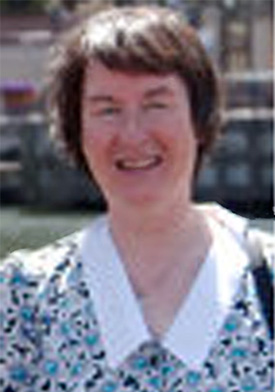
Dr. Carol Byrne, above, gives more details on the US Bishops meeting
here |
And when Archbishop Kurtz, Vice-President of the USCCB, asked about any opposition, he was interrupted in mid-sentence by Card. Dolan who moved on to the next topic in the twinkling of an eye. He did so before any of the Bishops could take a breath to say “no”.
This is a travesty of the voting rule that was recorded live. It is available in the video of Tuesday afternoon General Session, part 1, November 13, 2012, General Assembly, which can be seen at USCCB.com (minutes 35:55 ff). As the camera shows, it was not possible in that lapse of a split second to ascertain if each single Bishop had voiced his agreement.
We can also see in the video that there was not even a proper discussion prior to the “voice vote” in which the pros and cons of Dorothy Day’s case were brought to the
voters’ attention. Instead, the voters were subjected to a series of pep talks on Dorothy Day delivered by a few Bishops who are known for their left-wing views.
In addition to the expression of “feelings” and a few meaningless platitudes from Bishop Murphy and Cardinals McCarrick and O’Malley, there was a highly politicized anti-state, pro-pacifist talk by Card. George of Chicago who, as he explained, had been influenced by Dorothy Day since he was a seminarian.
The USCCB seems to have passed through the Looking Glass into a world where the rules of honesty and fair play do not apply. By Canon Law, the Church needs considerably higher standards of evidence than this for the canonization procedure.
So, where did the idea of a “unanimous” vote come from? It was rashly assumed by Day’s supporters, having originated from the over-enthusiastic pens of Fr. James Martin, S.J., in
America magazine and William Doino in First Things. It is significant that of all the journalists who covered the story, the only ones who did not make the assumption of
unanimity were those not affiliated with the Catholic Worker.
Day’s close connection to Communism
2. Question – What was the nature of her “flirtation” with the Communist Party? The Times says, “she converted to Catholicism in 1927, citing a spiritual awakening that was accelerated by the joy that she felt upon the birth of a daughter, Tamar.” Did she abandon her devotion to pro-communist causes after her conversion to Catholicism? Please explain what the FBI file about Dorothy Day shows.
Answer: In my book Critical Analysis I have provided solid proof that even after her conversion to Catholicism, Day was a member of several socialist organizations and was actively involved in political groups and trade unions whose founders and leaders where predominantly Communist Party members. She also supported the causes of individual communists who were in the pay of the Soviet Union.
This must be considered against the doctrine of Popes who condemned Communism as “intrinsically evil”: They forbade Catholics from supporting Communists, and in July 1949 Pius XII issued a decree of excommunication against anyone who collaborated with communists or joined their associations. There is evidence to show that Day simply shrugged off the papal ban. She did not see Communism as a real problem, or experience any moral quandary for a Catholic working in coalition with such groups professedly dedicated to “Justice and Peace.”
My book also contains documentary evidence to prove that Day supported the policies of hostile foreign powers operating from Moscow, Havana, Peking and Hanoi against her own country, the USA. She also wrote favorably about such socialist dictators as Lenin, Castro, Mao and Ho Chi Minh, even though they had all violently persecuted the Church in their respective countries.
Nor could she in principle bring herself to condemn the social and economic ideals of Marxism. Her actions flowed from this ideology and were not constrained by such limiting factors as Catholicism or patriotism. In fact, Day was so radical and anti-American that the FBI placed her on the federal government’s Security Index.
Suspected as communist by the FBI
I have a copy of Day’s complete 581-page FBI file, which covers some of her speeches and writings from 1940 (when she opposed the Compulsory Military Training Bill) to the
1960s (when she took part in the Kremlin-controlled Peace Movement).
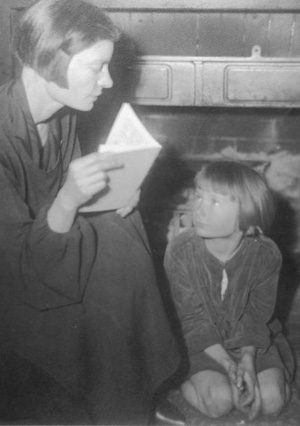
Daughter Tamar took second place to Day's activism and career at Catholic Worker |
A document of April 3, 1941, in the FBI files signed by J. Edgar Hoover states of Day: “It is recommended that this individual be considered for custodial detention in the event of a
national emergency.” The files mention the “suspicion that the Catholic Worker [newspaper edited by Day] was a ‘front’ publication for the Communist Party which hides under the rather innocuous name of the ‘Catholic Worker.’”
Although Day’s name was removed from the Security Index in December 1944, the FBI continued its surveillance of her movements, particularly her attendance at communist-
led meetings and strike action. …
As for the “joy” and “spiritual awakening” that Day allegedly felt at the birth of her daughter, Tamar, these were evidently short-lived. For Day soon dumped her daughter
for her “career” as a political agitator. Tamar herself is on record as recalling the emotional pain she experienced throughout her childhood as a result of maternal privation even in times of illness. Whatever “spiritual awakening” might have taken place
at that juncture of Day’s life was soon overlaid with a desire to co-opt the Catholic Faith
for the service of a Communist revolution.
U.S. Bishops dupes of Alinsky’s socialist tactics
3. Question – You have described the United States Conference of Catholic Bishops as “little more than a left-wing coalition.” Explain the basis for this statement.
Answer: I have no political allegiance whatsoever. I am not a citizen of the United States and do not wish to get embroiled in American politics. I base my opinion on the
establishment of the Catholic Campaign for Human Development (the word “Catholic” was added later), which the National Conference of Catholic Bishops initiated in 1969.
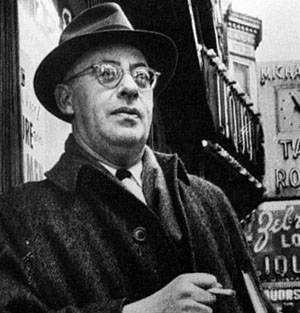
Alinsky's tactics were adopted by Day, below, in her social activism
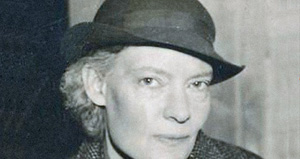 |
It has since come to light that this organization created a slush fund from millions of dollars donated by Catholics in the pews to finance agencies and charities that promoted far-left ideologies (some of which supported abortion, homosexuality, illegal immigration, and Marxist-inspired agendas). And all this has been going on for decades under the umbrella of the U.S. Bishops exercising their newfound “collegiality” or, to put it more bluntly, political cronyism.
It is only when we examine the roots of the CCHD that we can see where agenda-driven radicals like Dorothy Day - and, incidentally, Barack Obama who had been trained in Alinsky tactics - fit into the picture. The CCHD was set up in Chicago to finance the “Community Organizing” of Saul Alinsky, a self-proclaimed atheist, a believer in situational ethics, a pro-abortion lobbyist and a totally unscrupulous reformer.
Alinsky’s tactics consisted of Marxist rabble-rousing techniques to stir up the poor to seize power (regardless of moral or ethical considerations) from the rich and privileged. He had a deep-seated contempt for traditional values whether it was in religion, private property, business or government circles. And yet he was idolized by many of the U.S. Bishops who fell for his program, and by other ultra-left ecclesiastics like Mgr. Jack Egan who channeled archdiocesan funds to him. Alinsky was also a hero of Dorothy Day who heaped encomiums on his work – the details of which are found in my book.
Why have the American Bishops been ignoring the glaring faults of the CCHD for decades? The answer is the same reason that they are ignoring the truth about Day who also promoted Marxist Community Organizing for future revolution. The silence of the Bishops about Day’s pro-communist record and their complicity in the process of her canonization has come about because much of the USCCB body politic has succumbed to far-left ideology.
Resisting the Day canonization
4. Question – Your book has been seen as a “wake-up call” not only for modern Catholics, but also for American citizens. What can and should Catholics do about the process of making Dorothy Day a saint?
Answer: Catholics who believe that the claims about Day’s sanctity are demonstrably bogus and that the USCCB is committing a miscarriage of justice in pursuing her canonization should exercise their right under Canon Law to make their concerns known to the Hierarchy in a spirit of charity and respect. This would entail in the first instance writing to their local Bishop and to Card. Dolan and (whether they receive a reply or not) then to the Prefect of the Congregation for the Causes of the Saints in Rome.
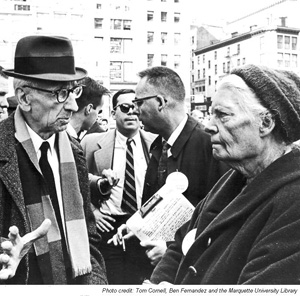
AJ Muste and Day burn a draft card to protest the war in Vietnam |
An important point to make is that Day’s reputation for holiness has not been established or even subjected to a rigorous examination of all the evidence. Card. O’Connor’s letter of February 2000 to the Vatican, which requested the opening of Day’s Cause, should be cited as evidence that the proposed canonization was based on false claims.
He alleged, for example, that after Day became a Catholic she never joined any “political groups hostile to the Church, for example, communists, socialists or anarchists,” and that “she did not approve of their tactics.” However, as noted above, my book provides incontrovertible evidence that she did these things after her conversion to Catholicism.
The Cardinal was similarly misinformed about Day’s attitude to private property. It is a matter of historical evidence that she called for common ownership of property and the means of production and even favored communal child rearing to replace the traditional family.
As for the Church’s criteria for determining holiness – orthodoxy of faith, filial submission to ecclesiastical authority and the fulfillment of one’s duties of state – it
should be pointed out to the Bishops that Day fell far short in these areas.
In doctrinal matters, she often preferred her personal interpretation of the Faith, the Scriptures, the Church Fathers, the Saints and the Papal Encyclicals. She was prepared to reject the Church’s spiritual authority whenever it conflicted with her political convictions and often infringed the Canon Law that was in force during her lifetime. Add to this her unpatriotic stance and the neglect of her maternal duties, and we can see that she fell far short of even the ordinary holiness expected of Catholics in their everyday.
Conservative who support Day: The Wanderer & Opus Dei
5. Question – Are some conservative Catholics also ignoring the truth about Dorothy
Day? Please name them.
Answer: The problem here is that the majority of Catholics do not have access to the truth about Dorothy Day because the most important aspect of her work – her lifelong support for Communism – has been ruthlessly suppressed by her leftist supporters who are seeking her canonization. It is conceivable that some conservative Catholics, deceived by the “pious” image of a woman who “helped the poor,” might be induced to cheer her canonization or at least not to oppose it. Those who probe no further and rely solely and uncritically on Catholic Worker sources for their news about Day – and for an interpretation of that news – will be unable to see the truth about her or form an independent judgment.
I know of only three “conservative” Catholics who have made a conscious effort to ignore the truth about Day: Paul Likoudis, editor of The Wanderer newspaper, and two priests of Opus Dei, Fr. Malcolm Kennedy of New York who had been personally acquainted with Day during her lifetime and Fr. John McCloskey, a well-known author
and public figure.
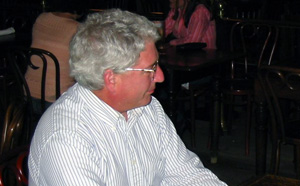
Wanderer editor Paul Likoudis did a turnabout on Day Day; below, Fr. McCloskey
puts Day on his Catholic Reading List
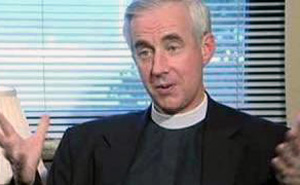 |
In an article of January 2006, Paul Likoudis stated that he once thought of Day as “acommunist, a traitor” under the influence of what he termed the “anti-Day propaganda prevalent at the time that the Catholic Worker was a communist front.” It appears from Likoudis’ article that his sudden “conversion” was effected under the influence of two members of the Executive Committee of the Dorothy Day Guild for her canonization who had written a book that simply airbrushed Day’s pro-communist activities out of existence.
When we consider that it was the same Paul Likoudis who had published a series of articles in The Wanderer exposing the connection between Saul Alinsky and the CCHD and criticizing the USCCB for its support of that organization, the inconsistency of his position staggers the imagination. He seems to have forgotten that it was Day herself who admired and recommended the very “community solutions of Saul Alinsky” (Ave Maria, December 3, 1966) that he criticized for their Marxist radicalism.
At least one thing is clear: as a supporter of Alinsky, Day cannot be said to be carrying out the Works of Mercy as understood by the Church. To both Day and Alinsky, “organizing”
was a euphemism for “revolution.”
Fr. Malcolm Kennedy is reported in a recent article in First Things to have been impressed by Day’s “unwavering commitments to her activism and goals,” which he was convinced were “utterly faithful” to her “vocation” as a Catholic.
Fr. John McCloskey called Day a “great Catholic social worker and activist” and recommended Day’s The Long Loneliness as part of his Catholic Lifetime Reading Plan and as part of his “100 essential Catholic books for your library.”
Supporting left-wing goals may come as a surprise to those who thought of Opus Dei as
a reactionary right-wing organization, but it has shown interest in Day’s lay radicalism
since 1956 when one of its priests, Fr. William Porras, invited her to speak at the
Harvard’s Catholic Club of which he was chaplain.
Day’s ambiguous position on abortion
6. Question – The New York Times says the Bishops are “finding inspiration in her decision to support the Church’s opposition to abortion.” Was she in fact pro-life? And how did this develop in her life?
Answer: Interestingly, there is no evidence that Day publicly supported the Church’s opposition to abortion in a way that clearly and unequivocally demonstrated her adherence to Catholic teaching. She did not, for example, become involved with any of the Catholic pro-life associations that had sprung up since the 1960s or witness for the Catholic Faith on marches, pickets and demonstrations specifically to ban abortion.
Instead, she devoted her life as an agitator and propagandist for communist-led enterprises – the industrial strikes of the ‘40s and ‘50s, the Peace Movement and the Civil Rights marches of the ‘60s, the anti-Vietnam War protests of the ‘70s etc. In addition to this, she used the Catholic Worker (CW), the newspaper she edited for almost 50 years, as an organ of propaganda in favor of Communism. That is how she was chiefly remembered in the popular view of her contemporaries who dubbed her “Moscow Mary.”
As she was not a public figure associated with the anti-abortion crusade in America, it is a little contrived, to say the least, that Card. Dolan should promote her on the American scene as a prime role model of pro-life activism. Where is the evidence for this?
There are various apocryphal stories provided by Day’s supporters purporting to show that she opposed abortion. But the evidence on this issue is sketchy and open to question, leaving us with the impression that many aspects of the story just don’t add up.
Day herself never made a public statement about her own abortion, and there were several occasions when she intentionally passed up the opportunity to speak or write against the issue. As Fr. James Martin recounted in America magazine, when Day was asked by a fellow Catholic Worker, Daniel Marshall, to write against abortion in her newspaper “as possibly the central moral issue of our time,” she refused.
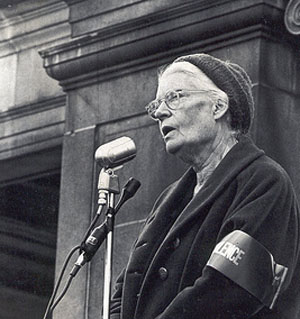
Day spoke out publicly on many social issues, but never against abortion |
When invited to comment on abortion at a meeting of the Women’s Liberation movement in South Dakota, she did not address the issue but spoke instead about her work and travels, instructing the audience that “the struggle as far as I could see was still a class struggle, and the big issue today was world poverty.” (CW, June 1971)
It seems that Day was more concerned about political issues of a Marxist variety - class warfare and anti-capitalism – and that these took precedence in her mind over the most moral of all issues, the right to life in the womb.
The suspicion is deepened when we consider that Day was one of the signatories on a statement opposing abortion issued by the Catholic Peace Fellowship in 1974 that contained a fundamental flaw – the “seamless garment theory” – which casts doubt on its conformity with Catholic Morals. The CPF statement used this theory to sow moral confusion by presenting “the inter-relatedness of the life issues, war, capital punishment, abortion, euthanasia and economic exploitation” and stating that “these issues are all of one piece.”
In signing this document, Day was obviously quite happy to use the Church’s non-negotiable teaching on abortion as a cover for a wider left-wing agenda against Capitalism, military defense and the death penalty (which have never been regarded by the Church as intrinsically evil).
Similarly, Day’s charge that abortion was tantamount to “genocide” is tainted with politics. In an interview with Hubert Jessup in 1974, instead of condemning abortion as intrinsically evil, she saw it as a conspiracy of rich white nations against ethnic minorities, as “a way of keeping down the population of the poor… Mexicans, and Filipinos, and the Blacks in this country.”
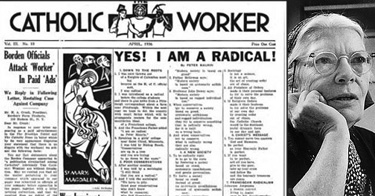
A self-proclaimed 'radical' in socialist issues, but not the pro-life movement |
We are furthermore entitled to be skeptical about Day’s integrity as a bona fide opponent of abortion from an opinion she gave in Catholic Worker that the Church’s judgment in the confessional on those who have committed abortion (along with divorce and contraception) is “always ‘not guilty’” (CW, December 1972). Was she perhaps trying to exonerate her communist friends, Elizabeth Gurley Flynn, Louise Bryant, Rayna Prohme and other radical feminists, for whom she had a lifelong admiration and who endorsed free love and women’s “reproductive rights”?
Let us look at how Day’s supporters try to rationalize her reluctance to join the pro-life crusade and militate clearly and publicly against abortion. In his fore-mentioned article, Fr. James Martin recounts the following private conversation with Robert Ellsberg who is publisher of Orbis Books (a notorious outlet for Liberation Theology) and is a member of the Steering Committee of the Dorothy Day Guild for her Canonization:
“'It’s clear from her private writings,' Mr. Ellsberg told me, 'that Dorothy was very concerned about abortion, but she didn’t want to appear judgmental, partially because of her own experiences. Nor did she want to sound preachy, because she was very private about her abortion, and she didn’t share that part of her life. But she did speak about [it] with some people, including myself. In that case, a woman had just told her that she justified her own decision to have an abortion because Dorothy did, which may explain why Dorothy was so uncomfortable about talking about it.'”
Ironically, this statement illuminates a number of inconsistencies in Day’s commitment to Catholicism and provides at least one reason why she should not be held as a role model for women considering or recovering from an abortion. It was hypocritical of Day not to “appear judgmental” or to “sound preachy” on this issue when she did not hesitate to do this in her diatribes against Capitalism, civil defense and anti-communism. Again, we are forced to the conclusion that she placed politics before religious and moral issues.
And as it is admitted that a woman considered abortion morally right because Dorothy Day did it, it is reasonable to conclude that other women might follow suit. In the absence of any unequivocal and publicly expressed regret by Day herself for abortion on purely moral grounds, her proposed canonization could well encourage some women to see her as a role model to justify abortion.
7. Question – Is there anything Catholics can do about the political orientation of the Bishops’ Conference?
Answer: It would be an uphill struggle to convince the Bishops to reverse positions on the agenda they have adopted, for Socialism has managed to insinuate itself into the Church at every level from parish to papacy and is protected from on high. All the social encyclicals from Pacem in Terris (1963) to Caritas in Veritate (2009) are imbued with socialist ideas. Even the President of the Congregation for the Doctrine of the Faith is a staunch supporter of Liberation Theology and a disciple of Gustavo Gutierrez. But Catholics who wish to defend their Church and country against the destructive and corrupting forces of Socialism must keep up the good fight against all odds.
This interview wa first posted
on Exposing Marxism in the Church on December 22, 2012
Dr. Carol Byrne may be contacted here
|
Manners | Cultural | Home | Books | CDs | Search | Contact Us | Donate

©2002-2014 Tradition in Action, Inc. All Rights Reserved
|
 |
|